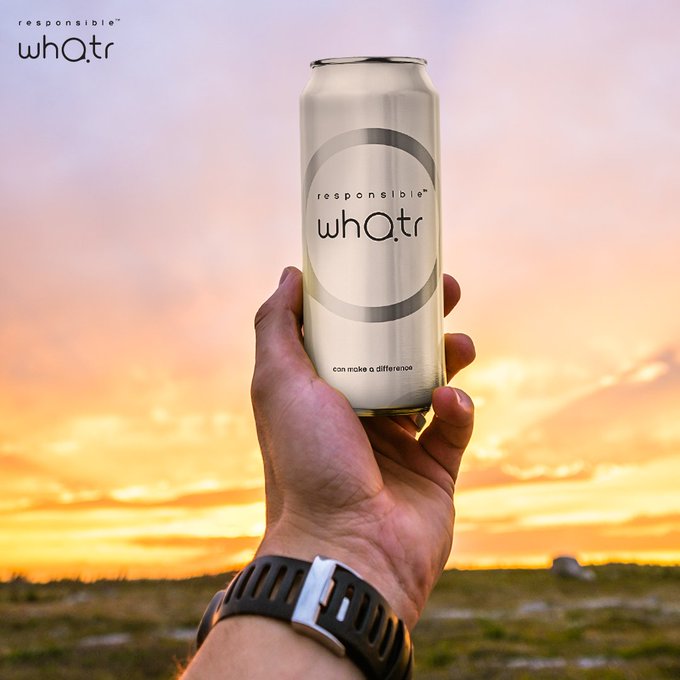‘What about the pandemic of plastic bottled water?’
Ankur Chawla of Responsible Whatr believes he can change the way Indians consume packaged drinking water by moving to aluminium cans
Responsible Whatr, a brand that sells natural spring water in aluminium cans, was set to be rolled out in March this year, the same month India went into a nationwide lockdown to fight the Covid-19 pandemic.
With the launch, Ankur Chawla was getting ready to fight a ‘pandemic’ of another kind: Consumption of water and beverages in plastic bottles.Chawla claims to have sold 1 lakh aluminium cans since his product hit the market in June. Given the price tag the fledgling brand carries—Rs60 for 500 ml of water—the numbers are a bit staggering. “The Covid-19 pandemic year is the right time to do something about another pandemic that we have unfortunately learnt to live with,” says Chawla, co-founder of Responsible Whatr, referring to the environmental disruption caused by the menace of water and beverages sold in plastic bottles. It is not just consumers, but even businesses that need to be responsible about sustainability, says Chawla, in an interview with Forbes India. Edited excerpts
:Q. Is aluminium a greener alternative? Production of such cans reportedly involves pumping large amounts of carbon into the atmosphere…
The use of recycled aluminium in cans cuts down greenhouse emissions significantly as compared to using virgin aluminium. Cans are made up of more than 70 percent recycled aluminium, and the recycled aluminium content can go up to 98 percent. When the per capita consumption of cans in India increases, along with the high scrap value of cans, they will be recycled more instead of reaching the landfills. We have to be responsible for our waste as well. Project Zero is one such initiative where we are offering to collect used cans from our institutional buyers. We then send the scrap back to our can manufacturers so that it can be converted into a fresh can for our consumers, thereby creating a closed loop.
Q. Is low awareness among consumers a challenge?
Covid-19 has not only made people more conscious about their health, but has also made them more responsible toward the environment. The trend is visible globally. For example, a recent YouGov poll in the UK revealed that consumers are open to the idea of buying water in aluminium cans once they are made aware of recyclability. According to the poll, just 53 percent adults are aware that aluminium is infinitely recyclable, and less than half are aware that aluminium cans are the most widely recycled containers for drinks. What is interesting is that 55 percent said they are more likely to buy water in a can if they knew that the can is infinitely recyclable.If people are regularly buying water or beverages in a plastic bottle, we need to look at the supply side as well, rather than just blaming consumers. The ready availability of water in plastic bottles and a lack of packaging alternatives are some of the other main reasons for such purchasing decisions. We need to disrupt this segment, [and change] the way water has been packaged and sold in India for decades.
Q. What were the early challenges when you started?
We have tackled a wide spectrum of challenges, be it fighting self-doubt, questioning the business model, or starting bootstrapped. We incorporated the company in early 2019 and worked on the project for almost two years before the launch. We were set to launch the brand in March, but the pandemic hit. So we postponed the launch to June. The pandemic made us realign business strategy, and we focused more on ecommerce and selling online. We have sold cans across 14 states, developed a subscription plan for direct consumers. It has been challenging, but we never presumed it would be easy.
Q. Would your price tag—Rs60 for 500 ml—make it expensive for price-sensitive Indians?
All good brands of natural spring waters in the modern trade start from Rs50 and go up to Rs300. Responsible Whatr is just Rs60. The subscription models bring down the rates further. Cans are surely a better value-for-money proposition. The other benefits they bring along are unmatched too, be it handling and logistics, or recyclability and environmental sustainability.Also, it’s a myth that Indians love or are willing to pay for products that are priced cheap. It all boils down to value and benefits that are offered. The 500 ml can works best for two people, which was the major reason for launching with that. Now, we are getting many queries for single serves, which seem to be a prospective market. So our next product will be single-serve cans. We are also looking at launching a sparkling water beverage, as the segment is growing at a faster clip than the still water category.
Source: https://www.forbesindia.com/article/interview/what-about-the-pandemic-of-plastic-bottled-water/63543/1


